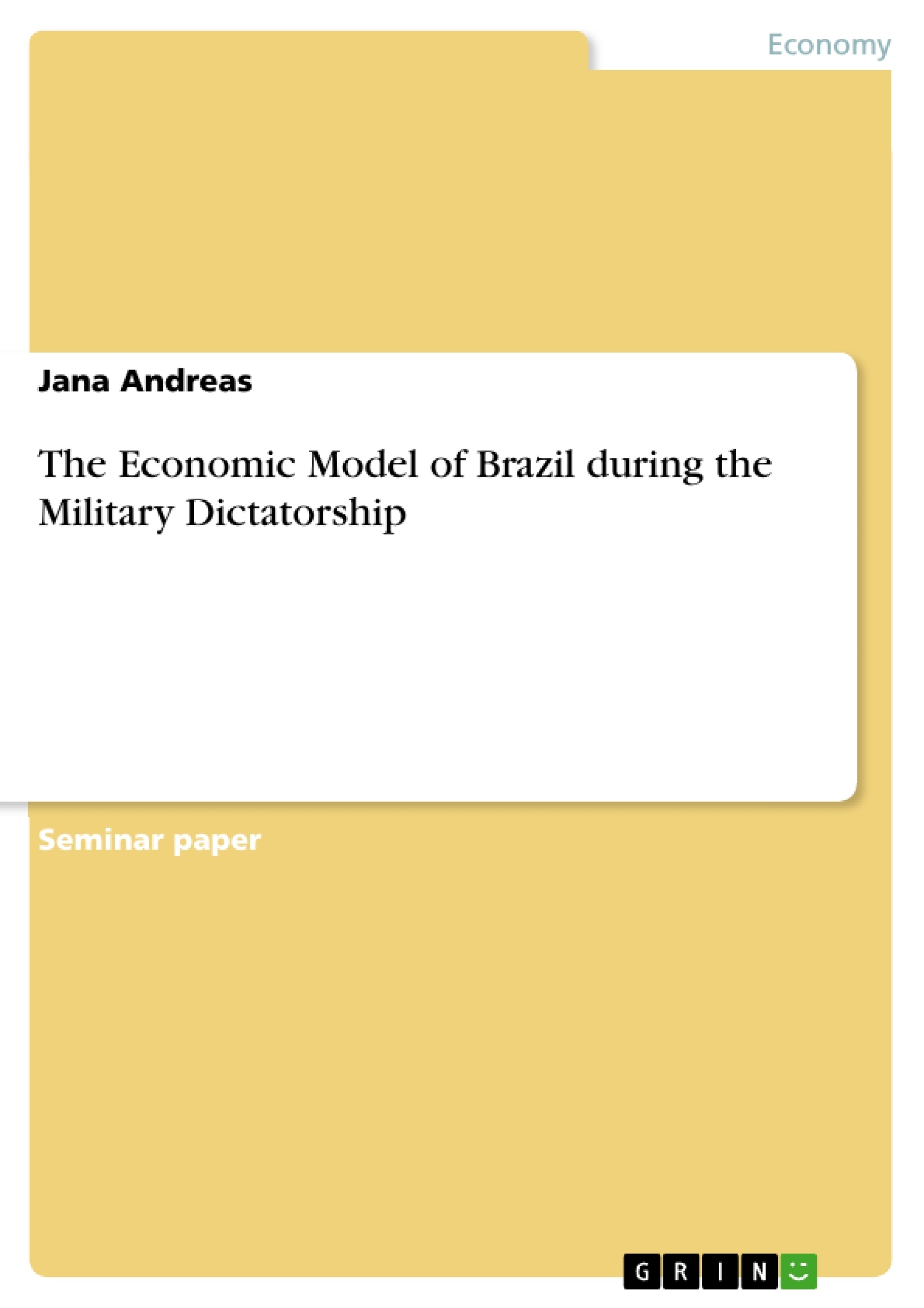The long discussed plans of the military to deprive the Brazilian President João Goulart of power were finally realized on 1 April 1964. The military justified this step with the argumentation, that Goulart was a populist. His policy was marked by hyperinflation and the polarization between the right and the left wings. The coup d'état was also necessary to fight the major enemy: the communism. The dictators of the military saw themselves as guarantors for a moral, political and economical reconstruction of Brazil and furthermore as an elitist leadership that connected military values with the strong belief in progress. In the following 21 years they established a new generation of regime-dependent technocrats and bureaucrats. The
preconditions for this progressive concept were lying within the fields of national security, elimination of political opposition and communist complots. Brazil found a reliable ally against the ‘communist threat’ in the USA.On 11 April 1964 Humberto de Alencar Castelo Branco was elected to become the first president of the military dictatorship that was going to last until 1985. This paper is supposed to give an overview about the economic model that the military pursued during their dictatorship. Among that it will show the rise and fall of this model and the consequences for the population.
Inhaltsverzeichnis (Table of Contents)
- Introduction
- Period of Reforms
- Rise and fall of Economic Miracle
- The Economic Miracle
- Investment in huge Projects
- The World Economy Crises
- Oil Crises
- Social Crises
- Searching for Solutions
- The End of the Economic Miracle - the End of the Military Dictatorship?
- The Lost Decade
- Back to Democracy
Zielsetzung und Themenschwerpunkte (Objectives and Key Themes)
This paper aims to provide an overview of the economic model employed by the Brazilian military dictatorship during their reign, exploring its rise, fall, and consequences for the population. The paper will focus on the period between 1964 and 1985, analyzing key elements of the model, including its focus on industrialization and modernization, the role of foreign investment, and the impact of large-scale infrastructure projects.
- Economic Policies of the Brazilian Military Dictatorship
- The Rise and Fall of the "Economic Miracle"
- The Impact of Foreign Investment and Debt
- Large-Scale Infrastructure Projects and Their Consequences
- The Social and Political Effects of the Economic Model
Zusammenfassung der Kapitel (Chapter Summaries)
The paper begins with an introduction that sets the historical context of the military coup in 1964 and its justifications. Chapter 2 focuses on the period of reforms implemented by the military regime, outlining its objectives for economic modernization and the key policies introduced to achieve these goals. Chapter 3 examines the rise and fall of the "Economic Miracle," a period of significant economic growth driven by foreign investment and state intervention. This chapter delves into the factors contributing to the success of this model, including the role of large-scale infrastructure projects and the impact of political repression. The paper concludes with a discussion of the "Lost Decade" of the 1980s, highlighting the economic and social challenges faced by Brazil as the military regime transitioned towards democracy.
Schlüsselwörter (Keywords)
The primary keywords and concepts explored in this paper include economic development, military dictatorship, "economic miracle," foreign investment, state intervention, infrastructure projects, political repression, and the "Lost Decade." The paper analyzes the relationship between economic policy, political power, and social outcomes within the context of Brazil's military dictatorship.
Frequently Asked Questions about Brazil's Military Dictatorship
Why did the military coup occur in Brazil in 1964?
The military justified the coup by claiming that President João Goulart was a populist threat, leading the country toward hyperinflation and communism.
What was the "Economic Miracle" (Milagre Econômico)?
It was a period of exceptional economic growth between 1968 and 1973, characterized by high GDP growth, massive infrastructure projects, and significant foreign investment.
What were the negative consequences of this economic model?
The model led to a massive increase in foreign debt, high social inequality, and the suppression of political opposition and labor rights.
How did the oil crisis affect Brazil's dictatorship?
The 1973 oil crisis ended the "Economic Miracle," leading to high inflation and economic instability, which eventually weakened the military regime's legitimacy.
What is meant by the "Lost Decade"?
The "Lost Decade" refers to the 1980s, when Brazil faced severe economic stagnation, hyperinflation, and a debt crisis as it transitioned back to democracy.
- Arbeit zitieren
- Jana Andreas (Autor:in), 2007, The Economic Model of Brazil during the Military Dictatorship, München, GRIN Verlag, https://www.grin.com/document/70561



